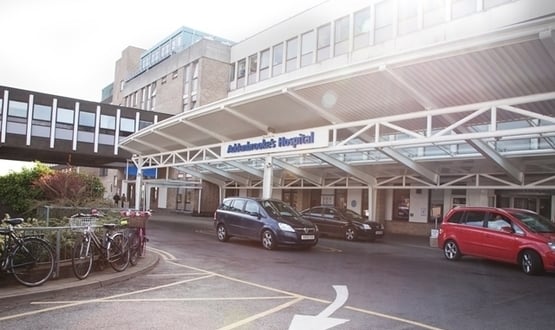Cambridge University Hospitals recognised as national digital leader
- 14 October 2021

Cambridge University Hospitals NHS Foundation Trust has been formally recognised for completing the requirements of the Global Digital Exemplar programme.
The trust became a Global Digital Exemplar (GDE) in 2017 as one of the leading digital trusts in the country. This month it received formal accreditation from NHSX for completing the requirements of the programme.
Dr Afzal Chaudhry, head of digital and consultant nephrologist at the trust, said: “The GDE programme enabled us to accelerate use of technology, embedding digital working into everyday clinical care and practice, whilst also assisting other NHS trusts to advance their digital maturity.
“Our two-year GDE programme supported us with initiatives including our implementation of ‘Scan for Safety’ – embedding a practise where clinicians use technology at the bedside to scan barcodes on patient wristbands, medications, expressed human milk, blood and blood products, and specimen collections. All barcodes are linked to our electronic record system to provide an added safety check.”
As part of the programme the trust also set up digital links with hospitals across the UK, international hospitals, and GP practices within the East of England to enable effective sharing of clinical information. This ultimately led to better patient outcomes, the trust said in a statement.
The trusts digital patient portal MyChart was also accelerated under the programme to enable patients to be more informed and involved in their own care.
The portal, which now has more than 84,000 users, provides patients with access to their hospital record, appointment information and tests results.
Dr Susan Broster, interim executive director of improvement and transformation at the trust, said: “To be officially accredited as a Global Digital Exemplar is a fantastic achievement and reflects the exceptional efforts of our digital team in collaboration with clinical staff.
“They have embraced and embedded digital ways of working as part and parcel of everyday care and practice to benefit patients, staff and healthcare partners.”
Sonia Patel, NHSX chief information officer, added: “Cambridge University Hospitals has demonstrated the clear benefits of digital transformation in health and care, with technologies like barcoding linked to electronic patient records making care safer for patients, and providing clinicians with the tools they need to do their jobs effectively and efficiently.
“The trust has also been a leader in establishing a joined-up approach across health and care providers locally.”
Even before the trust was given a place on the GDE programme it was focusing on widespread digitisation. In 2014 it moved away from using paper patient records through introducing digital ways of working.
Today more than 99% of all clinical activity across Addenbrooke’s and The Rosie hospitals is recorded within the trust’s Epic electronic patient record (EPR) system, the trust said in a statement.
The EPR system is used by clinicians, in real-time, using integrated computers, handheld and mobile devices.
In October 2020 the trust became the first UK trust to achieve Stage 7 of the international Electronic Medical Record Adoption Model (EMRAM) – the highest international quality standard that recognises the use of technology, data and analytics to support the delivery of high-quality inpatient care.
Cambridge joins North Tees and Hartlepool NHS Foundation Trust in being an accredited GDE trust.
GDE accreditation is given to NHS organisations that deliver improvements to quality of care through the world-class use of digital technologies and information.
Launched after the 2016 Wachter Review, the Global Digital Exemplar (GDE) programme aimed to a create a “cohort of digitally advanced exemplar provider organisations” which were then expected to pass their learnings to “less digitally-mature ‘fast follower’ provider organisations (FFs)” in a bid to enable large-scale digital transformation across the NHS in England.
The programme has supported 51 NHS acute, mental health and ambulance trusts to digitally transform – with local organisations required to match fund a total national investment of £302million.
A recent evaluation of the GDE programme found it largely achieved what it set out to do, but action needs to be taken to “address the existing digital divide across organisations”.




